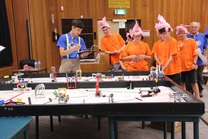|
If you follow the FRC blog, you may have seen the December 1 Mentor Monday post where I talked about some of my personal experiences overcoming obstacles on the road to becoming an engineer. I wanted to delve a little deeper into some of those issues, because interestingly, the vast majority of the obstacles I overcame were really just mental barriers I had created for myself. I think a lot of people can relate to these feelings and experiences, so let’s talk about not artificially limiting yourself.
One story I love to tell is about my high school robotics team’s path to success. As a student, I was a member of FRC 1124, The ÜberBots, from Avon, CT. Back in 2006, we competed at one event, the UTC New England Regional. On Saturday morning as we neared alliance selection, we were not ranked well - in fact we were ranked 40th out of the 42 teams at the event. We didn’t have high hopes for the rest of the competition, but we certainly hadn’t given up. We thought strategically. We had a consistent and strong autonomous mode and end game in a game where both of those were key, as well as good defense. So we worked on marketing our strengths to teams with strong offensive capability and trying to sell how we could fit into their strategy. Ultimately, we were selected to join an alliance with two strong veteran teams, and our alliance went on to win the regional. Working with those powerhouse teams also opened our eyes to a lot of strategy we had never been aware of before. They were gracious enough to mentor us and share their knowledge with us, which set us up for a much stronger future. In 2007, we went on to win the Connecticut Regional and were finalists on our field at the Championship event. In 2008, we continued to win the Connecticut Regional for the third year in a row, won our field at the Championship event, and progressed onto the Einstein field. All this because we didn’t give up or limit ourselves, and because we weren’t afraid to ask for some help along the way. But it’s one thing to sell your team or your friend - how come it can be so much harder to sell yourself? Most of the time, it is fear holding us back. Fear of how we are perceived - too self-promotional, too aggressive, too demanding - or fear of failure. The only real answer I know is to get over it. I suspect that people who know me will say something along the lines of “sure Ellen, that’s easy for you to say, you’re smart and successful”. I have a few different responses to that. First, I would argue that it is only because I have been willing to push back against my fear of failure that I have been able to become relatively smart and successful. I almost didn’t go to MIT because I thought it would be too hard. Unsurprisingly, it turns out that MIT is indeed quite difficult, but because I was willing to challenge myself and push my limits, I was able to learn and grow so much beyond I ever expected. “Smartness” is definitely not static - you get back what you put in. I would also say that sometimes, I don’t feel very smart or successful, and that is totally normal. We all have those moments. It can be easier to recognize other people’s strengths and successes than our own, which is how we end up building artificial limits for ourselves. Be willing to accept that other people have different strengths and talents, and they don’t invalidate or supersede your own. Don’t let not feeling good enough hold you back from trying things - you can never succeed at anything if you don’t even try. I remember applying for a FIRST scholarship in high school, not expecting much. After I later updated my recommender that I had received the scholarship, he confided in me that he was just as surprised as I was - he thought “no one ever wins those things”. I’m glad he had still been willing to put in the effort for me, just in case it came through. There have certainly been awards and scholarships that didn’t work out for me in the end, but if I let fear hold me back every time, I never would have won the things that I did. I also made the mistake of not negotiating on my first job, since I thought the offer was fair, and didn’t want to come off as too demanding. Of course, not negotiating puts you at a disadvantage compared to everyone who does negotiate. I recently accepted a new position, but this time I decided to try my hand at negotiating. They came back and offered to turn my “engineer” position into a “senior engineer” position, which never would have been possible if I hadn’t tried. Practice pushing back against your fears, it will get easier over time. There is no reason for us to create our own artificial barriers to success. This blog post was written by Ellen McIsaac. If you are interested in being a guest blogger for FIRST Ladies, sign up on the schedule.
1 Comment
Any mentor, student or parent can see the benefits FIRST has on the students who participate at all levels. FIRST helps to instill not only technical skills and problem solving, but also an excitement for these critical things in children and adolescents. All you have to do is what a single team, or even a single person through one year in FIRST and you will see that person grow and gain skills that will begin to set them apart from their peers. Being excited about science and technology, tackling a complex problem with a team and learning the tenants of gracious professionalism are all amazing things that make all FIRST students better people. Looking back on my time as a student in FIRST though, I realize I gained so much more. And I'm not talking about the amazing friends, mentors and experiences I was lucky enough to have (although those were pretty fantastic). I'm graduating from Drexel University in June with a Bachelors in Civil Engineering. I've had three six month internships while at school, and am now applying for full time positions for after graduation. As I am undertaking a job search, polish my resume and start interviewing, I have realized that so many of the skills I have used in my internships, skills I will ultimately use to (hopefully) have a successful career, were obtained back in High School, back when my life was all about FIRST. PassionIf there's one thing I learned as a student in FIRST, it was a passion for science and engineering. Simply put, passion sets you apart. People notice and respect passion when they recognize it in others. Being passionate about what you do, being able to answer the question: "Why did you decide to become an engineer?" makes you memorable. In an interview, in an office or in a classroom, being a passionate person will elevate you above your peers. You may be thinking, well, I'm passionate about FIRST, or my team, or my favorite robot I've built, but I don't know if I'm passionate about engineering, or about school, or about my job. I know how you feel. It's easy to be passionate about an organization when you have people like Woodie Flowers to look up to, and teammates and mentors who become your family. You can learn though to find things in your school and work life to be just as invested in. Once you've tapped into that passion and emotion once, it's easy to get back there. Being that person who is excited and invested in what they do will make you a better person, a better employee, and most importantly, happier. ConfidenceMost people have a pretty stereotypical image of an engineer in their minds. Quiet, bookish, maybe a little bit awkward. I've met and worked with those people, we all have, but there is just as much variety in the type of person who becomes an engineer as any other profession. I will say though, a confident young female engineer still seems unusual to people. I learned how to be confident in FIRST. I learned how to stand up in front of judges and tell them why my team deserved to win an award. I learned how to work in a team, when to take charge and when to defer to others. I learned how to create something I was proud of, take initiative, be brave. I can keep listing things I learned but honestly that gets boring. What all of this amazing learning did though was give me the confidence to tackle any challenge. Oh you think this interview is scary? When I was 15 I was writing and presenting Chairmans for my team. That was scary. I did that. I can do this. And so on. Whenever I start to doubt myself, or feel like I can't do something, I remember everything I accomplished in FIRST. If I could do all that before I was 18, I can definitely handle whatever comes next. I'm not saying I'm going to be the best, or even all that great, at everything I do, but I am going to be able to tackle it head on, with confidence in myself. CommunicationAnother (untrue) stereotype of engineers is that none of us know how to talk to other human beings. And again, although this is not completely true, being a strong communicator is an undeniable asset that almost every company puts on their list of desirable traits for a potential employee. Having experience in FIRST will more than likely set you up to either be a strong communicator, or at least have improved these skills. Working with other people can be really tough. Even when you like, love or deeply admire another person, working with them can still present some serious challenges. On my FIRST team I learned how to approach different kinds of people, how people change when they're under stress, but most of all I learned that when you're on a team, you have to be able to communicate with everyone. Most people who know me would say I'm a naturally talkative person, which is true, but talking is not the same thing as communicating. On my team I learned how important it can be to tailor your approach to a conversation depending on the mood and personality of the person you're talking with, and on the situation you're in. I learned not to take things so personally. I learned sometimes you just need to let people be angry. I learned sometimes people just need to rant and other times talking won't fix your problems. I also learned the difference between casual communication among teammates and formal presentation decorum. Conveying information to a judge at a competition was different then explaining your ideas to a mentor in the work room. I can't explain exactly how I learned these differences, these subtle approaches. A change in body language and tone, different vocabulary. No one every wrote out a manual, and yet I did learn these nuances things. Now when I give presentations or work on a team people notice these small things, this awareness and ability to communicate effectively. It doesn't matter whether you're in school, at an internship or home with your roommates, these skills you learn in FIRST will stay with you, and will improve your ability to communicate well into adulthood. Being Your (Female) SelfThis last one is tough. I have to be brutally honest. There are times when being a woman in engineering, and being a young lady in FIRST, really has sucked. It's not fun being the only, or one of just a few women in the room. It's not great to be under estimated, over estimated or just treated differently, and realizing it's because you have two X chromosomes. From the very beginning of my time in FIRST, and still to this day, I feel like I have something to prove. That I have to be not just as good as, but perhaps even better than my male peers. And for a very long time I struggled with acting feminine. If I was too girly then was I setting myself apart even further? But if I denied my love of pink, purple and sparkles was I making things worse? I've always been called "peppy" and "bubbly". I wonder, am I hurting myself by being so openly girly? We are lucky to be in a time and in a generation where people are becoming more and more open minded about gender roles. But it's still not easy being a woman, much less an extremely feminine woman, in an industry that's still so male centric. I still have doubts and questions about how my gender affects my standing professionally, but I will say that FIRST gave me a pretty ideal picture of what to work towards. When I was in FIRST I saw all girls teams with bright pink robots and team members wearing skirts. They competed on an even playing field with other teams. I never felt like my gender mattered when I was at FIRST competitions. I wasn't being judged on my personality, my team was being judged on our performance. And now that I've volunteered at FIRST events where I've been inside judging rooms, and I've never heard gender be brought up in a judging conversation. To be judged purely on your merits, on your performance, and not by your gender, is an ideal world that unfortunately doesn't exist very much outside FIRST. But being exposed to that world reminds me, there's nothing wrong with wearing a lot of pink. This blog post was written by Delia Votsch. If you are interested in writing a blog post for FIRST Ladies, please sign up on the schedule.
Boys and girls think and act differently, but that’s ok. By learning from each other, we can do more together than we could on our own.  Hi, my name is Jaye and I’ve been around FIRST since my sister started in FLL when I was 1 year old. Since then I’ve started doing FIRST on my own and this year was on an FLL team called The Flying Pigs based in Sydney Australia. The team consists of 6 people - Henry, Eleni, Jaye, Grace, Andres, and Cameron. This past weekend we won the Research Award at the FLL Australian National and came in third overall.  While I learned a lot about robots and how people learn this year, I think the biggest thing I’ve learned is that boys can be my friends too. Before FLL, I thought boys were disgusting and gross, but now I think they help me. They have taught me how they do things. My first year in FLL I was on an all-girls team and I think by being on a co-ed team I’ve seen we can do more because the boys and girls think differently. Our diversity allows us to approach the same problem in different ways. This means we can come up with better solutions because we have more ideas to try and test!  Boys and girls think and act differently, but that’s ok. By learning from each other, we can do more together than we could on our own. How many of you know the feeling when you’re at a competition, you look around and find yourself surrounded by guys? We get things “mansplained” to us, and sometimes we get pushed around just because we are the only girl on the field. I graduated this past year, and went to college for Aerospace Engineering, on a campus where the ratio is 18% girls. That same feeling I got at every competition, I get on campus. FIRST prepares us for almost every aspect of life; working as a team, developing a business plan, and practical uses of engineering skills. One thing that it prepared me for, was college as a female engineering major.
For starters, not much is different than being at a competition on a male dominated campus. We tend to get the “girl jokes” from time to time, and we without a doubt feel the ratio weighing heavily against our favor, but it isn’t too noticeable other than when you glance around a classroom of 20 and see only 2 girls. But how do we deal with it? Not so much as cope with the ratio, but even just find more girls on campus to hang out with besides our roommate? 1. Get Involved: There are a number of organizations for women to get involved in on campus. The biggest one is SWE (Society of Women Engineers). Clubs and organizations like SWE are a great way to connect with the other females on campus and spread the word about encouraging more girls to get involved in STEM. 2. Team Up: Like I said before, even in a class of 20, there is no way that you are the only girl in the class. Sure, you are definitely going to be friends with plenty of guys on campus, but try to get to know the few other girls in the class. The chances are they are feeling the same ratio you are, and they are looking for a few girls to be their friends too. 3. Join a Sorority: Sometimes sororities are viewed with stereotypes. But, although I didn't join one, they are great ways to get to know all the female engineers on campus. Sometimes, you just need to know there are other girls there for you, even if it is just to do your hair for the ROTC Ball or Homecoming. Now, although most colleges have a number of opportunities for women in engineering to get involved, if you are having trouble finding a way to reach out to other females on campus, go to your engineering department and talk to them about opportunities for women on campus. A lot of colleges are looking for more female engineers, and departments are more than willing to tell you about what is available for you on campus. Overall, as a female on a male dominated campus, it isn’t a big deal. We need more women in engineering, but view campus as another FIRST competition, you are all competing for the same thing with equal chances of being successful. |
Be a guest
Do you want to be a guest blogger for FIRST Ladies? You can write about a topic of your choice! Anyone can submit a blog, especially our Regional Partner teams! Please email us the a Google Doc of the completed blog. Thank you! Archives
April 2024
|

 RSS Feed
RSS Feed
